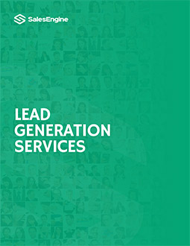Category:
Building High Performance Sales Teams
| 0
The purpose of a sales team is to sell and generate revenue. Beyond that simple scope, all else falls beneath the to-do list. Across all industries, companies of every shape and size make the salesperson a swiss army knife, taking on roles and responsibilities far skewed from pitching leads and closing deals. The difference between an average sales team and a high-performing machine really comes down to keeping salespeople focused on selling.
Average Sales Teams
Salespeople are meant to be specialized, mastering the art of how to pitch and close deals. Unfortunately, sales professionals have been burdened with a ton of non-selling activities. Giving salespeople non-selling activities is often the norm, but it significantly cripples their ability to crush their sales quota. Characteristics of an average sales team are a lack of quota achievement, higher employee turnover, and an unsustainable lead generation process that is time intensive.
Less Time Selling
67% of the average sales professional’s time is spent on activities other than selling (Gartner). The personalities and employment experience of these team members are tailored towards talking, building relationships, and being on the front lines of making deals. When being saddled with the weight of administrative activities or other parts of the sales process, their ability to meet sales quotas are severely limited.
Unreliable Turnover
The average sales team has a high turnover rate. The average turnover time for a salesperson is only 14 months. When taking into consideration that most salespeople take 6 months to hit quota, this translates into only a few months of hitting quota before they leave for another company. This makes it hard to keep talent and build the foundation for a sales team that consistently hits quota. This constant on-boarding also requires training, additional resource use, and realignment with the rest of the sales process.
Unsustainable Sales Process
On top of this sobering data, salespeople are a small but crucial part of the overall sales process. The average sales team operates as an unstable and unscalable component to customer acquisition, constantly struggling to reach sales quotas from quarter to quarter. With an inconsistent supply of qualified leads and high turnover, it is difficult for them to hit quotas, making it very challenging to scale sales across the organization.
High-Performance Sales Team
In contrast, high-performance sales teams possess the power to quickly exceed sales quotas. The differences between what sales teams are and what they could be lie in a couple of key characteristics: sales focus, minimal distractions, a steady supply of qualified sales leads to make selling easier, and a motivating compensation structure. Building this environment for selling creates structure and makes hitting sales quota an improvable and scalable component of your company’s growth.
Sales Focus
Great salespeople are given time to focus on sales without distraction. When on average 67% of their time spent is spent on non-selling activities, even a small reallocation of time towards more selling can produce big improvements. More meetings can be scheduled and more leads can be pitched and closed. It also let’s them focus more energy on nurturing leads and moving them through the sales process. The overall results of a sales-focused team is one that produces more sales.
Selling Made Easier
Most sales teams sell more because it is easier to sell. High-performing salespeople are supplied with enough qualified sales leads necessary to easily reach sales quotas and allow for scalability. Instead of pushing this responsibility to salespeople, which takes time and focus away from pitching and closing deals, these teams are streamlined and equipped with everything then need to succeed. Teams that are given the tools and resources to achieve their goals will succeed beyond those that are saddled with distractions and obstacles.
Sales Compensation
Finally, talented salespeople need the motivation and incentive to crush their sales quotas. Regardless of the above characteristics, employees are only dedicated to performance when they find value in doing so. Offering a competitive compensation package for a sales team makes them hungry to close, and hungrier to close as many as they possibly can. In addition, offering training and a clear career map for salespeople gives talented members a long-term incentive to stay with your company. This helps you retain talent within your sales team and leverage compensation incentives to motivate them to crush their sales quotas.



